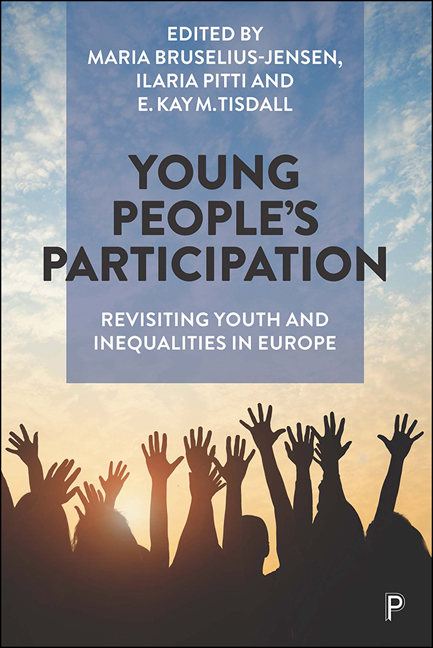Book contents
- Frontmatter
- Contents
- List of figures and tables
- Notes on contributors
- Acknowledgements
- 1 Revisiting young people's participation: an introduction
- PART I Young people's experiences of participation and engagement
- PART II Current state and conditions for young people’s participation: critiques and trends
- PART III Broadening participation: young people's own approaches to participation
- PART IV New opportunities for young people's participation: facilitating new forms of youth participation
- Index
12 - Young people seeking asylum: voice and activism in a ‘hostile environment’
Published online by Cambridge University Press: 18 December 2021
- Frontmatter
- Contents
- List of figures and tables
- Notes on contributors
- Acknowledgements
- 1 Revisiting young people's participation: an introduction
- PART I Young people's experiences of participation and engagement
- PART II Current state and conditions for young people’s participation: critiques and trends
- PART III Broadening participation: young people's own approaches to participation
- PART IV New opportunities for young people's participation: facilitating new forms of youth participation
- Index
Summary
This chapter sets out the grassroots activism of a group of four young people aged 24–29 who were seeking asylum in the UK's ‘hostile environment’. Moving away from normative definitions of political participation as the formal activities of citizens, the analysis draws upon second wave feminist and Classical Marxist understandings of collective action. The chapter argues that by ‘speaking bitterness’ and creating ‘language from below’ in order to craft a play to depict dramaturgically their lived realities, the young people formed collective action and did politics ‘differently’. They engaged in biographically meaningful, ‘personal-political’ and ‘political-personal’ activism that focused on the particular needs of their wider group. They also made ‘democracy anew’ by practising democracy informally and in alternative, co-equal, meaningful and purposeful ways, within a hostile environment that ‘others’ them and alienates them from political and social participation.
Key findings
• Alienated from formal political processes, and isolated by an increasingly populist and right-leaning democracy, the young activists aspired to form a collective to do politics ‘differently’.
• Using methods of co-production embedded within the organisation, the young activists engaged in biographically meaningful, ‘personal-political’ and ‘political-personal’ collective action that resonated deeply with feminist and Classical Marxist politics, focusing on the particular needs of their wider group.
• In making ‘democracy anew’, the young activists utilised many tools of collective action, and found voice and collectivism despite, and perhaps because of, the hostile environment. Their grassroots activism was practising democracy differently.
Introduction
Over the seven years since it first (re)surfaced in 2012 to describe the UK government's political intention towards net migration into the UK (Kirkup and Robert, 2012), the phrase ‘hostile environment’ has become everyday coinage while the conditions of the hostile environment are ubiquitous. The hostile environment refers to the conditions within which migrants and those seeking asylum survive in the UK and includes measures to prohibit legal working, enforce destitution, and limit access to housing, healthcare and bank accounts. It is ‘characterised by a system of citizen-on-citizen immigration checks … astronomically high immigration application fees, the continued policy of indefinite detention, the Byzantine complexity of the rules, the enforced separation of some families, the infamous “Go Home” vans and more’ (Yeo, 2018).
- Type
- Chapter
- Information
- Young People’s ParticipationRevisiting Youth and Inequalities in Europe, pp. 195 - 214Publisher: Bristol University PressPrint publication year: 2021



